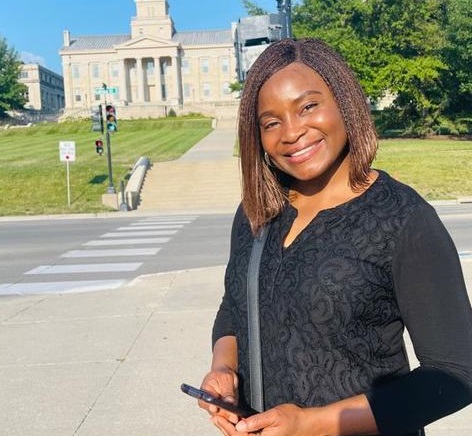Onyeche Oche is a PhD student and research assistant at the UI College of Pharmacy. She came to the University of Iowa in January 2020 and recently applied for and received permanent US residency. Hoping it will help others, she recalls her experience with the process.
What brought you to the US and the University of Iowa?
I came to the US for graduate studies and first completed a master’s degree in Business Administration with a Health Care Administration specialization in Cleveland, Ohio. After graduating and working in Cleveland for some years, I decided to come to the University of Iowa for further studies, intending to change my career path to academia or health care consulting.

Why did you pursue permanent residency?
When I decided to pursue US permanent residency, I had lived in the US for about seven and a half years and just moved to Iowa from Cleveland after converting my work visa to a student visa. At that point, I was tired of the restrictions tied to visas, for instance, not being able to get certain jobs, fellowships, and internships, even after meeting all stipulated requirements. In my case, after becoming a US-licensed pharmacist, getting a job as a pharmacist while on a work visa was challenging, and after changing my work visa to a student visa, it became an impossible dream to achieve.
Upon realizing, therefore, that I had the qualifications to obtain US permanent residency and could petition by myself, I jumped at it because it meant that I could break free from work-related visa restrictions, get a job as a pharmacist, health care administrator, or consultant, take advantage of other benefits that a permanent resident status brings, and eventually become a US citizen.
What would you say to other international students about the residency process – any advice?
My path to permanent residency was through the EB2 NIW (Employment-Based Immigration: Second Preference - National Interest Waiver). It is a process that requires proving to the US government that your contribution to society is so valuable that they should waive the need for an employer to sponsor your permanent residency application. It therefore allows the applicant to self-petition for permanent residency. You must either meet the “Advanced Degree” or “Exceptional Ability” criteria to qualify for this. I met both criteria but filed under the exceptional ability criteria because I met more than three of the seven listed criteria for exceptional ability. To qualify, you need to meet at least three.
In addition, all employment-based petitions are required to be accompanied by a labor certification document from one’s employer (if an employer is filing on behalf of the applicant), stating that the employee’s salary would continue to be paid while the application is under consideration. However, because I was not filing through an employer, I had to request a waiver (National Interest Waiver or NIW) of the labor certification by meeting another three criteria stipulated by the USCIS (United States Citizenship and Immigration Services) relating to: 1) the substantial merit and national importance of my research endeavor, 2) my ability to advance that endeavor, and 3) why it would be beneficial to the United States to waive the requirements of a job offer, and the accompanying labor certification.
Information about this can be found on the USCIS website.
My advice to other international students would be to keep building your resume by gaining qualifications that improve your eligibility to self-petition and eventually get US permanent residency through the EB-2 NIW. This could mean getting professional licenses, obtaining memberships in professional associations, becoming a peer reviewer, and publishing papers in your area of interest. In addition, identifying people in your field (within and outside of Iowa) that could write reference letters for you when you self-petition is invaluable. I was extremely fortunate to have two of my professors here at the College of Pharmacy and another professor outside of Iowa write reference letters for me.
How long did the process take?
It took two years and eight months (32 months) from start to finish. I filed my petition at the start of the pandemic and my processing time was delayed because of staffing challenges experienced at USCIS during that period. Although the duration varies for everyone, I would encourage potential applicants to be prepared to exercise a lot of patience with the process. It is long and nerve-wracking, and can be expensive too, especially if you want to hire a competent lawyer to handle your case.
Was there a ceremony or do you take an oath?
For permanent residency approvals, there is no official ceremony. What you receive is a green plastic card indicating the date that you became a US permanent resident and the date the card would expire (after 10 years). However, after being a US permanent resident for five years, an application for US citizenship can be submitted and the countdown to the official oath-taking ceremony can commence.
What are your future plans after you earn your PhD?
The first thing I plan to do, post-PhD, is to take a long vacation to a yet-to-be determined location, to enjoy some peace and tranquility after the stress of the last few years.